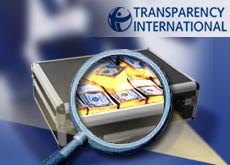
Swiss criticised over political funding

Switzerland needs to come clean over political funding, according to global anti-corruption watchdog, Transparency International (TI).
But in its latest annual report, the organisation praised progress made by Switzerland in the fight against money laundering.
The Global Corruption Report 2004, published on Thursday, focused on political corruption – ranging from vote buying and use of illicit funds to the abuse of state resources.
TI found that Switzerland had no transparency laws on political party financing. This put it among the 23 per cent of countries – including El Salvador, Uruguay, Sri Lanka and South Africa – which are not governed by regulations.
In total 102 countries were surveyed.
Philippe Lévy, the president of Transparency Switzerland, says it is clear that Switzerland is lagging behind in this field.
“There are regulations in three out of four countries throughout the world but last week in parliament they rejected a proposal for more information on the sources of financing of public votes,” Lévy told swissinfo.
Integrity clause
Lévy says a first step would be to increase transparency so that the origin and level of political funding is known.
But he adds that there have only been a few large-scale criminal corruption cases in Switzerland and that the problem lies mainly with minor incidents of corruption, especially in the area of public procurement.
“That is why we have proposed the introduction of an integrity clause, which exists in a number of countries already, where both parties involved in public procurement have to sign a declaration where they certify that no corruption is involved,” said Lévy.
The TI report ranked countries in different areas of political corruption. The Swiss did well when it came to “irregular payments in government policy making” and the “prevalence of illegal political donations”.
But the country fell down when it came to “policy consequences of legal political donations”, only achieving an average score.
Illegal funds
However, Switzerland received praise for measures it had taken to combat corruption by heads of state and to repatriate stolen foreign money that had been deposited in the country.
The report cited three notorious cases where heads of state had stashed money looted from their countries in Swiss bank accounts – Mobutu Sese Seko of the Democratic Republic of Congo, Ferdinand Marcos of the Philippines, and Sani Abacha of Nigeria.
It said that banking secrecy had made Switzerland a haven for illegal funds in the past. According to estimates, one-third of the world’s illegal wealth has been secreted in Swiss banks at some time.
But the report noted that legal action taken on behalf of Holocaust victims in the late 1990s to retrieve funds held in Swiss banks had played a major role in opening up the banking sector.
“With the appointment of uncompromising examining judges such as Carla Del Ponte and Bernard Bertossa, armed with powers to force disclosure and freeze assets, Switzerland quickly developed a legal climate that now leads the global fight against money laundering,” said the report.
Positive
Lévy said he was pleased that the report was positive – as it was last year – about Swiss efforts to combat money laundering. But he conceded that there were still legal problems with returning funds that had been seized – as the Abacha case illustrated recently.
He added that one of the most positive developments was that Switzerland was managing to shake off its image as a centre for money laundering.
“Today we are not only seen as one of the good guys, but we are also considered among those that have a system which should be followed by others,” said Lévy.
He added that awareness of corruption had increased among the Swiss public administration, businesses and NGOs.
“But much still remains to be done to make sure that not only the awareness is there but action is taken to avoid situations where corruption takes place,” he warned.
swissinfo, Isobel Leybold
Switzerland has no laws regulating political funding. Three out of four countries do.
Switzerland was ranked among the countries with low political corruption for “irregular payments in government policy making” and the “prevalence of illegal political donations”.
But it only achieved an average political corruption score for “policy consequences of legal political donations”.
It received praise for measures to tackle money laundering and was cited as an example for others.

In compliance with the JTI standards
More: SWI swissinfo.ch certified by the Journalism Trust Initiative




























You can find an overview of ongoing debates with our journalists here . Please join us!
If you want to start a conversation about a topic raised in this article or want to report factual errors, email us at english@swissinfo.ch.